Division for International Research and Educational Cooperation
Graduate School of Science and Faculty of Science , Tohoku University
Home > News & Topics > [Report] International Students' Gathering 2024~Working in Japan~
News & Topics
[Report] International Students' Gathering 2024~Working in Japan~
▶ Information before the event
This year, DiRECT once again hosted its International Students' Gathering on Working in Japan, an event where invited speakers can share their 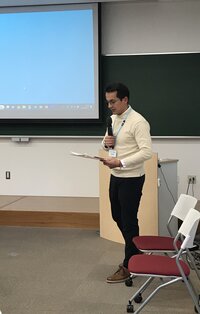 invaluable experience and knowledge with international students at Tohoku University to help them pursue a career in Japan after graduation.
invaluable experience and knowledge with international students at Tohoku University to help them pursue a career in Japan after graduation.
At this year's gathering, we welcomed three guest speakers. Two of the speakers, Dr Satria Zulkarnaen Bisri and Ms Kashfia Ahamed, are alumni from Tohoku University and gave talks about their experiences before, during, and after their time at Tohoku. The final speaker, Dr Yukiko Momma, is a current faculty member at Tohoku University and works at the Center for Career Support, which offers assistance to students, both international and Japanese, in finding and applying for work after graduation.
Each of the three speakers gave a twenty-minute powerpoint presentation to the students who attended the event. The students were then given a chance to ask each speaker questions at their tables in twenty-minute sessions, and finally there was time for free discussion amongst all attendees and speakers while enjoying snacks.
Below, summaries of each speaker's presentation and their responses to some of the questions asked by students are provided. Please click the link attached to the name of each speaker.
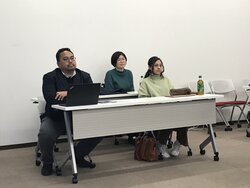 ▶ Dr Satria Zulkarnaen Bisri
▶ Dr Satria Zulkarnaen Bisri
(IGPAS Class of 2011/Physics/Indonesia/Assoc. Professor/Tokyo University of Agriculture & Technology)
▶ Ms Kashfia AHAMED
(IGPAS Class of 2019/Chemistry/Bangladesh/Research and Development Chemist)
▶ Dr Yukiko Momma (Center for Career Support, Tohoku University)
* * * Voices from participants * * *
- "In the presentation the overall scenarios of working in Japan were excellent. Because all the information was very clear and inspired me to catch the opportunities and how to overcome different challenges".
- "The presentations have detailed information about both speaker's background and experiences, and also about the schematics of working in Japan."
- "The round table talk was a good opportunity to ask specific questions each listener was interested in. The speakers answered well with their own experience."
- "Round-table talks help me to share effectively which in my mind. I enjoyed different personal questions and answers about working in Japan".
How to work in Japan for post-graduation (Dr Yukiko MOMMA)
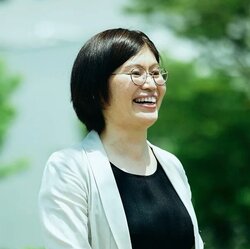 Profile
Profile
Dr Momma is from Japan, and is a senior lecturer at the Institute for Excellence in Higher Education in Tohoku University.
She also works for the Center for Career Support, which offers assistance to both International and Japanese students in finding a career after graduating from Tohoku University.
Presentation
Dr Momma explained in her presentation many of the cultural differences between Japan and other countries in work and hiring practices. She also outlined a typical yearly schedule for companies' internships and hiring processes, and offered advice for international students with respect to Japanese language requirements and how to make a good Japanese CV/resume. Lastly, she introduced those in attendance to the many helpful services offered by Tohoku University, DATEntre, and agents which specialise in assisting international students.
Dr Momma began her presentation by explaining that graduation is a transition from a life that is dominated by learning to one dominated by working. She told students that they must consider how they wanted to utilise their research and study up until graduation in their future: with whom, where, and how do they want to work and live? She made clear that this should be considered not only for the period immediately after graduation, but also for five or even ten years on.
She then highlighted some major differences in the job-hunting process between Japan and other countries. For example, it is common for Japanese students to start job-hunting 1.5 years before graduation, and one's major in university is not considered as important in Japan as the individual applicant's personality, experiences, reasons for applying, for a career-track position, which is mainly for those with undergraduate or master's degrees, etc. She stressed the importance of preparing for job-hunting activities well before graduation and making a job-hunting schedule that does not conflict with one's university studies.
Dr Momma then discussed Japanese language requirements. Dr Momma mentioned that major Japanese companies will require at least an N3 or higher in the JLPT (Japanese Language Proficiency Test) or higher levels of Japanese for science students. However, she also provided a graph from the 'Survey on Career and Retention for International Students' by the Ministry of Economy, Trade, and Industry in 2015,' which showed that the majority of companies in Japan in fact require a J1 or higher in the BJT, (Business Japanese Proficiency Test) and roughly 90% require at least a J2 in the BJT or an N1 in the JLPT. Dr Momma concluded that it is important for anyone wanting to work in Japan to study for either the JLPT or BJT and get a good score. She also mentioned that, for positions that do not necessarily require Japanese, students might try startup companies or academia.
Dr Momma next explained the importance of having well-written entry sheets and CVs/resumes. She stressed the importance of filling these out in both English and Japanese, and informed students that the Center for Career Support will help any students in writing the Japanese version. She then gave ten basic rules to follow when writing these documents:
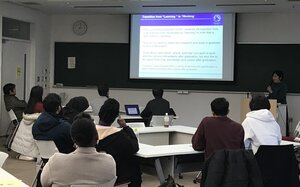 1. Use a black pen
1. Use a black pen
2. Write in a polite and sincere fashion (think about each phrase you commit to paper)
3. Watch out for spelling mistakes, incorrect kanji, and incomplete sentences
4. Try not to leave any blank spaces
5. Express yourself concisely in short sentences
6. Use your own words and expressions
7. Call upon actual experiences
8. If you make a mistake, start over from the beginning
9. Only write what actually happened
10. Once you have finished, read what you have written
She also told students to make a photocopy of all entry sheets before submission, so that they can review what they wrote before any interviews.
Dr Momma went on to discuss internships in Japan. She said that a typical Japanese internship is one week long and unpaid, and that internships in English are typically found in IT startup companies and might be for two weeks or longer. Dr Momma then introduced students to two fundamental aspects of the Japanese employment system: seniority and lifetime employment. She explained that "Employees are expected to increase their knowledge and experience with years of service, and to be able to fulfil important positions and responsibilities," and that this is "A system that rewards contributions to organsations. long working hours and overtime." In exchange for this hard work from its employees, Japanese companies are expected to provide them with lifelong employment.
Dr Momma concluded her talk by showing the students several free resources for help with job-hunting in Japan. For information regarding how to write entry sheets, do well in interviews, etc, she shared the following two websites: Career Support Network System for International Students and Job Hunting Guide for International Students. She also informed the students of DATEntre, a career support program for international students. She introduced the following two agent services: RYUKATSU and Mynavi, as well as the PhD Career Development Unit in Aobayama.
Finally, please remember to check Dr Momma's own Center for Career Support at Tohoku University for any advice and assistance with your job-hunting activities in Japan!
Q&A Session
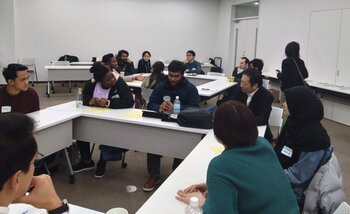 Q: Is Japanese necessary to become a professor in Japan?
Q: Is Japanese necessary to become a professor in Japan?
A: If you want to work within the management system of the university, you will need Japanese. Teaching is also usually done in Japanese, although there are some programmes taught in English. Lastly, there are some universities in Japan whose main language is English, such as Akita International University.
Q: You mention that job-hunting usually begins a year and a half before graduation, but one might not have many research accomplishments that early. What should they use to demonstrate their abilities in that case?
A: Companies do not place as much importance on research accomplishments as academia. They are more concerned with one's logical thinking abilities and communication skills.
Q: What is it like to change companies mid-career in Japan?
A: It is common for employment contracts to include non-compete contracts preventing employees from changing to another company that works in the same industry.
Q: Is networking important in Japan?
A: Networking is just as important in Japan as any other country, but even more so for those without Japanese. Companies often provide information about employment opportunities only in Japanese, so who can't read Japanese will need to rely on their network more. Also, English-speaking positions, such as internships at Apple or Google for example, might only be posted on social networks like LinkedIn.





